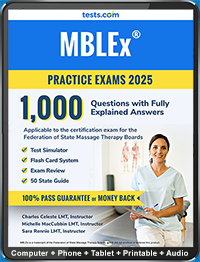New Jersey Massage Therapist License Exam

To get licensed in New Jersey, massage therapists are required to take a massage exam that covers such subjects as anatomy, physiology, pathology and kinesiology. Whether you live in Atlantic City, Ocean City, Wildwood or another city or county, the resources below will help you get started on the path to receive your massage license.
Need of a Massage License: A massage therapist needs to be certified to practice massage therapy in New Jersey.
Who Grants a License: Certifications are granted by the New Jersey Board of Massage and Bodywork Therapy.
Qualifications to become Certified: There are three ways to get certified as a massage therapist in New Jersey, through education, endorsement and examination.
By education, a candidate needs to complete a minimum of 500 hours of class study in the field of massage and bodywork approved by the Board.
By endorsement, a candidate must have a license or certification from another state where the standards substantially equivalent to New Jersey.
By examination, the candidate must pass one of the following exams:
- Massage and Bodywork Licensing Examination (MBLEx)
- National Certification Commission for Acupuncture & Oriental Medicine (NCCAOM)
Applying for the Massage Exam: Candidates can apply online to take the MBLEx. More information can be found on the MBLEx in a Candidate Handbook.
The application to take the NCCAOM Exam can be found at NCCAOM application. More information can be found on the NCCAOM Exam in the Certification Handbook.
Exam Content: The MBLEx and the NCCAOM Exam have the following content:
MBLEx
The exam consists of 100 multiple-choice questions with four choices provided for each question. Test takers have 110 minutes to complete the computer-based exam.
The exam is divided into eight content areas:
- Anatomy & Physiology
- Kinesiology
- Pathology, Contraindications, Areas of Caution, Special Populations
- Benefits and Physiological Effects of Techniques that Manipulate Soft Tissue
- Client Assessment, Reassessment, & Treatment Planning
- Overview of Massage & Bodywork History/Culture/Modalities
- Ethics, Boundaries, Laws, Regulations
- Guidelines for Professional Practice
NCCAOM - Asian Bodywork Therapy Exam
The exam consists of 100 multiple-choice questions and test takers have two hours and thirty minutes to complete the computer-based exam. The exam uses an adaptive testing process, where the computer-based exam determines the level of the candidate based on whether a correct answer is given to a specific question. If a question is answered correctly, the next question is a bit more difficult. If the answer to a question is incorrect, the next question will be a bit easier. You are unable to return to a previous answer in the adaptive testing process. The adaptive testing process determines a candidate’s knowledge level and a certain level must be attained to pass the exam.
The exam is divided into eight content areas:
- Practice Management
- Assessment
- Analysis and Differentiation of Syndromes/Patterns
- Treatment Principle
- Evaluation/Adjustment of Treatment
- Client Education
- Apply Treatment
How to Apply for the License: Candidates must provide the Board, in part, the following documents: (1) completed application; (2) basic life support certification; (3) criminal history background check; (4) verification of completed course of study if applicable; and (5) verification from the FSMTB or NCCOAM. The documents should be sent directly to:
New Jersey Office of the Attorney General
Division of Consumer Affairs
New Jersey Board of Nursing
Massage, Bodywork and Somatic Therapy Examining Committee
124 Halsey Street, 6th Floor
PO Box 45048
Newark, NJ 07101
Phone: (973) 504-6430
Fees: There are fees to apply to become a licensed massage therapist.
License Renewal Requirements: A massage therapist must renew their license every 2 years and complete at least 20 hours of continuing education every 2 years.
Applicable Regulations: Massage therapists in New Jersey are regulated by the New Jersey Board of Massage and Bodywork Therapy Laws, 45: 11-53 et seq.



